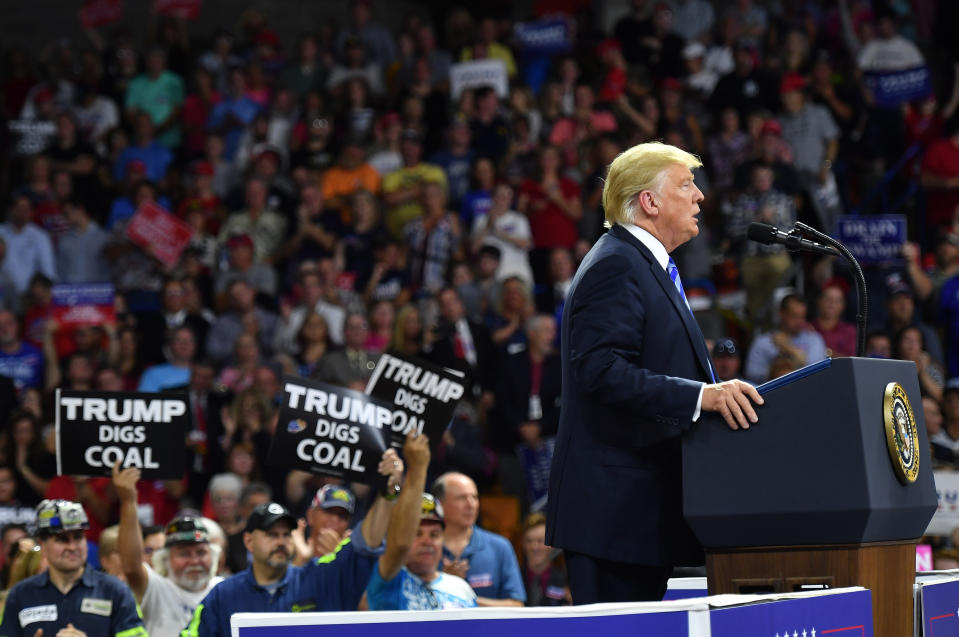Ending the Clean Power Plan won't stop the sun or the wind — or save the coal industry

The Trump administration’s proposal to replace the Clean Power Plan (CPP), President Barack Obama’s signature policy to fight climate change, has been widely denounced for prioritizing profits over the public health. Although the administration says it will save jobs in the coal industry, economists think the more likely effect will be to slow the growth of the renewable-energy sector, with fewer new jobs created.
But energy-industry consultants agree the long-term shift away from coal and toward wind and solar power will continue no matter what Trump does.
The Environmental Protection Agency (EPA) proposed on Tuesday its Affordable Clean Energy (ACE) Rule, which would allow states to write their own, weaker regulations for power plant emissions or request permission to opt out altogether. Trump boasted about “canceling Obama’s illegal, anti-coal, destroying regulations” and mocked the CPP at a rally in West Virginia that night.
“I’m getting rid of some of these ridiculous rules and regulations which are killing our companies, our states and our jobs,” Trump told the enthusiastic crowd. “Just today we announced our new affordable clean-energy proposal that will help our coal-fired power plants and save consumers — you, me, everybody — billions and billions of dollars. We’ve eliminated a record number of job-killing regulations.”
But coal’s decline and renewable energy’s ascent predominantly stem from market forces rather than Obama’s policies. Under the CPP, enforceable limits on carbon emissions wouldn’t even start until 2022 and would only reach full effect by 2030.
In American electric power generation, there are 574,000 renewable-energy jobs — solar, wind, hydro, bioenergy, geothermal — and only 86,000 coal jobs, according to the Energy Department.

Noah Kaufman, an economist at the SIPA Center on Global Energy Policy at Columbia University, said that, taken in isolation, dismantling the CPP is unlikely to have a large effect on the clean energy industry.
“Look at its expected effects on emissions, according to EPA: the CPP would’ve led to power sector CO2 emissions of 36 percent below 2005 levels by 2030, while the Trump plan will lead to 33-34 percent reductions. Doing nothing at all will lead to 33 percent reductions,” Kaufman told Yahoo News.
“Of course, these estimates are highly uncertain, but the general point that these policies are too weak to significantly change the current market-driven pathway of the U.S. power sector is pretty robust.”
On the other hand, he said, the federal government’s continued inaction on climate change will hurt future growth in the clean energy industry and set back efforts to reduce greenhouse-gas emissions. SIPA’s recent research found that a carbon tax starting at $50 per ton would reduce power sector carbon dioxide emissions by 72 to 82 percent by 2030.
A carbon tax, which many economists favor over outright regulation as a more efficient, free-market approach, “would be an enormous boon to the clean energy industry, both in the power sector and beyond,” Kaufman said.
Gregory Wetstone, the president and CEO of the American Council on Renewable Energy (ACORE), a national business group made of companies that finance, develop and use all forms of renewable energy, said the administration is looking for ways to somehow subsidize old power plants so they can compete with renewable energy, which is cleaner and less expensive in most parts of the country.

“If you look at where the Clean Power Plan was going as proposed under President Obama, I think you would conclude that we’re going there anyway, as a result of economies of scale and technological innovation,” Wetstone told Yahoo News. “We’re seeing dramatic reductions in the cost of wind and solar power that are not able to be matched by anything they can do anywhere in the coal sector.”
He said renewable energy is not some kind of partisan, “niche, boutique sector” — it’s the largest source of new electricity generation for the past decade.
“The idea that we have political leaders that are ready to discount an economic sector that’s important is troubling at minimum,” Wetstone said.
According to Environmental Entrepreneurs (E2), a group of business leaders advocating for pro-business and pro-environment policies, Trump’s ACE would undercut job growth, hurt the economy and push innovation overseas. E2’s “Opportunity Lost” report argues that undoing the CPP would represent a failure to capitalize on economic benefits for the U.S.
Their analysis found that the CPP could create up to 560,000 jobs and add $52 billion to the gross domestic product in 2030. Naturally, these benefits will vanish if the CPP is repealed. The study also found that undoing the CPP would result in fewer investments in energy efficiency, which would chip away at economic benefits from lower electricity bills.
“Repealing the CPP would eliminate a significant opportunity to create hundreds of thousands of additional jobs and billions of dollars in additional economic value,” the report reads.

Trump’s critics find it ironic that conservatives like House Speaker Paul Ryan, who condemned Obama’s support for renewable energy — because the government shouldn’t be “picking winners and losers” — are now praising Trump’s advocacy for the coal industry.
Sharon Pillar, a consultant for E2 in Pennsylvania, expressed pride in her home state’s traditional-energy history. But she said people in these communities, including most coal workers, know that this is not the future.
“Our leaders should be working to reinvent our coal communities to bring in new opportunities so we can diversify our energy mix,” Pillar told Yahoo News. “The news about repealing the Clean Power Plan is really disheartening and really doesn’t make economic sense.”
Greg Smith, the founder and president of Energy Optimizers, an energy efficiency company in Ohio, said he’s often mistaken for a liberal because of his job but identifies as fiscally conservative and politically independent.
“What we do, it’s got to make financial sense,” Smith told Yahoo News. “That’s why this industry the last 10 or 15 years has been so awesome. It’s a job-growth industry and by the way — not trying to be a tree-hugger — it’s good for our planet. Last I checked, we only got one of those.”
He thinks Trump’s actions will slow job growth in clean energy and incentivize the use of older technologies. He said there are more economic opportunities in new-energy technology and wants the U.S. to lead in this realm, but that a few stand to gain from propping up old systems.

“There’s a lot of things that I do personally agree with Trump on, but on this one he’s off the mark and listening to people with the wrong intentions: personal financial gain,” Smith said. “I’ll say that openly. I’m sorry, the people with money in this country are making the calls to Washington, D.C., and that’s not the way our founders intended it.”
Energy Optimizers primarily helps K-12 school districts in Ohio identify opportunities to reduce their expenses for electricity and natural gas. He said energy-saving enhancements to these buildings usually pay for the cost of the project.
“The beautiful part is that it’s every workforce that represents the United States. It’s not just blue-collar or white-collar, it’s both,” he said. “It’s blue-collar workers like my dad, who worked in a factory, installing and implementing these technologies. But it’s also the highly educated engineers and things of that sort able to use their education.”
Dan Whitten, a spokesman for the Solar Energy Industries Association (SEIA), said it’s not immediately clear how Trump’s actions will affect the solar energy industry. He said such long-term policies have a long road to implementation.
“We have serious doubts about this proposal, and the long-term impacts are potentially very negative. We’re not sure that as written this proposal will ever see the light of day,” Whitten told Yahoo News. “If it were finalized, it would be a step back in terms of dealing with climate and potentially a step back for clean energy.”
Regarding the immediate prospects for the EPA’s proposed ACE Rule, he said, “The happiest people in Washington right now are the lawyers on both sides who are going to spend the next five years fighting over this.”

According to SEIA, the solar industry has seen an average annual growth rate of 59 percent over the last decade. Whitten said it went from being a fraction of one percent of the electricity pie to close to two percent.
“We think we can get to five percent over the next five years. While it’s still a small piece of the pie, it’s growing, and we’re moving toward double figures and being a serious player in the electricity pie. I think the market is driving that,” Whitten said. “The market’s not going away. If you have the lowest priced product, you’re going to grow.”
Dismantling the CPP might buy time for a few isolated coal power plants before they have to close shop. But industry experts say it’s extremely unlikely that anything will reverse the industry’s decline. The EPA’s own analysis of the proposed rule found that coal would continue its descent even without environmental regulations.
Bob Inglis, a former Republican congressman from South Carolina, founded the Energy and Enterprise Initiative (E&EI) to research and promote free enterprise solutions to climate change. He expects the long-term nature of the utility business to guide its decision-making more than one administration’s policies will.
“I’m not sure whether the renewable industry is going to be that affected by this decision by President Trump,” Inglis told Yahoo News. “The power industry makes 40-year generation decisions, and the administration will last perhaps two years, perhaps six years, but almost inevitably something is coming after this administration that will call for a lower carbon footprint.”
He said long-term renewables are clearly the future because we’re heading toward a carbon-constrained world, and the Trump administration’s climate change denial is an aberration. He thinks it’s irresponsible to “live in some imaginary world where greenhouse gases are not wreaking havoc.”
But as a conservative environmentalist, Inglis never supported Obama’s CPP and thinks there should be a carbon tax that charges polluters for how much space they take up in “the trash dump of the sky” — incentivizing industries to make smart decisions to move away from carbon-intensive energy sources. E&EI supports RepublicEn: an online community of conservatives who describe themselves as “energy optimists and climate realists.”
According to Wetstone of ACORE, the Trump administration may have little interest in internalizing the traditional energy sector’s externalities — pollution’s effects on public health and the climate — but businesses have been investing in renewable energy to deal with this problem. He said these externalities are going to be addressed one way or another and that products like electricity generation will be priced in ways that reflect the costs they impose on the planet.
“What we’re talking about here is the biggest externality in the history of economics,” Wetstone said. “Most people in American business believe this externality is going to be addressed one way or another.”
_____
Read more from Yahoo News:


